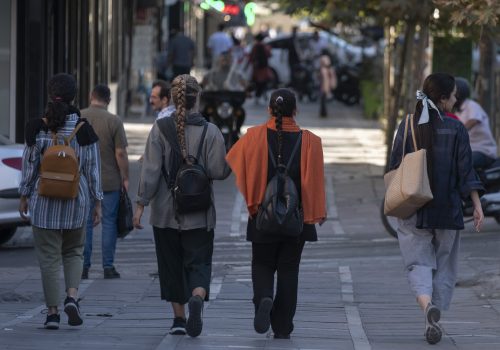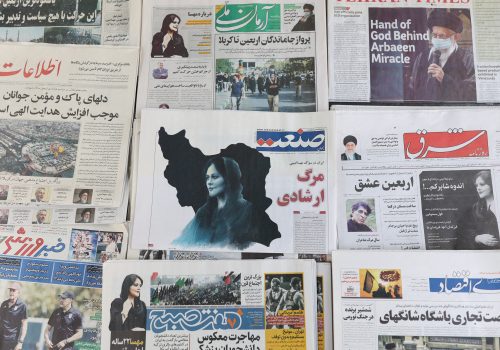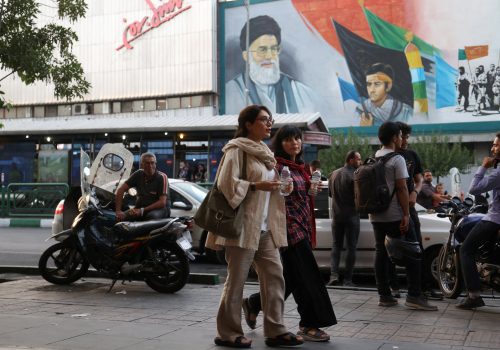Nobel laureate Shirin Ebadi: ‘If we don’t unite—we won’t be able to topple the Islamic Republic’
Nobel laureate Dr. Shirin Ebadi is a renowned Iranian judge, lawyer, and champion of human rights. In 1975, she became the first female judge in Iran, but after the 1979 Islamic revolution, she was dismissed from the position for being a woman. Continuing her legal career as a lawyer, Ebadi worked to strengthen the legal status of women and children in Iran and took on many pro bono cases for dissident figures and their families. These activities led to Ebadi’s arrest in 1999, where she spent twenty-five days in solitary confinement.
Based on her work, Ebadi founded two non-governmental organizations: the Society for Protecting the Rights of the Child in 1994 and the Defenders of Human Rights Center in 2001. Ebadi is a published author with numerous books and, in 2003, was awarded the Nobel Peace Prize—the first woman in the Muslim world. Since then, she has continued her work with various international and domestic human rights groups and efforts and is currently involved with the Women, Life, Freedom movement. Earlier this year, Ebadi was one of the eight prominent Iranian opposition figures part of what became known as the Alliance for Freedom and Democracy in Iran (AFDI) before the coalition dissolved.
Our IranSource editor, Holly Dagres, had the pleasure of sitting down with the Nobel laureate on September 14 to discuss the ongoing protests in Iran, the AFDI, and where she thinks the country is heading.
IRANSOURCE: It’s been one year since Mahsa Jina Amini’s murder at the hands of the so-called morality police, which prompted the ongoing anti-establishment protests. Where do you think these protests are going?
DR. SHIRIN EBADI: The murder of Mahsa Amini was like striking a match on dynamite. In over one hundred cities, demonstrations started, and they still continue. So, from my perspective, this is a revolution. This is a process. What I mean is that it takes time.
Look at it like a train. A train will get to its last station one day, but there are many stations that the train will stop at to let passengers out, let them in, or for many other reasons. I know that the last station is the toppling of the regime, and I know that we will get there, but I do not know when we will get there.
IRANSOURCE: You lived through the 1979 revolution. When you look at the current ongoing protests which are, in your words and the protestors’ words, a “revolution,” what are some lessons?
DR. SHIRIN EBADI: Fortunately, there are no commonalities there. In 1979 we had a leader—one leader. And, unfortunately, the culture in that area is such that the leader then becomes a dictator. In order to avoid dictatorship, people are now working in different groups. And there are different leaders in different groups. And if there is a democratic election, people will elect leaders who are working in these groups. The 1979 revolution was a religious revolution, but, here, what people want is a secular democratic government.
IRANSOURCE: We’re here in Washington, and there’s a lot of skepticism about the protests and whether they will lead to any meaningful change. Why do you think that is?
DR. SHIRIN EBADI: Because [the West] looks at it from a short-term point of view. They think that if people take to the streets, in six months, things will change. That’s not true. It takes time. Revolutions take time.
IRANSOURCE: How can the international community help Iran’s protestors?
DR. SHIRIN EBADI: The international community, meaning nongovernmental organizations and the media, can play a huge role. That is bringing the voice of the people of Iran to the world.
IRANSOURCE: I’ve heard you mention the Islamic Republic is a gender apartheid regime. Can you unpack what that means?
DR. SHIRIN EBADI: Apartheid is a term that is used in international law, and it has been used for the situation in South Africa. At that time, it was mostly racial, meaning the government, which was a white government, did not count Black people and their rights were not recognized. They killed them and did not recognize any rights for them, and the result they had in mind—or their goal—was to cleanse them so that no one else would revolt.
Now, I think we are dealing with gender apartheid. There are now groups and governments who do not recognize the identity of women. I’m not saying they will hold a gun and kill women directly, but what I’m trying to say is that they separate women to the extent that it calls for their annihilation.
In the laws of the Islamic Republic, for example, it is written that the life of a woman is worth half of the life of a man or that the testimony of two women equals the testimony of one man. This means that they do not recognize women as complete human beings. Or, when laws take away rights from women, what they are doing is not recognizing the humanity and identity of a woman. Therefore, there are no differences between what I’m saying right now and the experiences of people of color in South Africa. I do not think there is a difference. If the expression of apartheid is used in racial issues, why should it not be used in gender issues?
I hope that one day, when I look at the situation of women in the world, I see that gender apartheid has become a crime against humanity. In many countries, there are different campaigns. I hope that they get together and coordinate their efforts so that they can work better on gender apartheid.
IRANSOURCE: We now know the news of the hostage deal between Tehran and Washington. What are your thoughts on that?
DR. SHIRIN EBADI: The fact that $6 billion was released in exchange for hostages… I think it is wrong diplomacy and results in taking more hostages. Whenever the Islamic Republic wants something, it will throw a few innocent people in prison.
I cannot believe why the Joe Biden administration does not want to accept this fact. They do say that the two issues have nothing to do with each other, but we all know what the story is. The Islamic Republic has been able to take hostages from the beginning of its formation and ask for its demands to be met.
IRANSOURCE: So how should the international community respond to the Islamic Republic?
DR. SHIRIN EBADI: The international community should not strengthen the government through transactions with the Islamic Republic. Unfortunately, the US government talks about human rights, but, when they are signing a financial agreement, what they forget about are human rights.
IRANSOURCE: Let’s talk about the Iranian opposition coalition: the Alliance for Freedom and Democracy in Iran. Why did the group not succeed?
DR. SHIRIN EBADI: I think that we talked about the coalition too early. We should have been better organized before we talked about it. I want to talk about why it is that Iranians do not unite. Among the opposition, of course, there are a lot of differences, but there are two important issues. One is for a monarchy and the other is for a republic. And the other issue is the difference between extreme nationalists and extreme ethnic groups. If we can resolve these two issues, then we can unite people and topple the regime.
The coalition was based on partners that tried to resolve these issues. The charter was based on resolving these two issues. So, on one hand, we have [former Crown Prince] Reza Pahlavi, who was the representative of the monarchy, and three other people who were for a republic. There was a big change when they signed a specific statement that they agreed together [the Mahsa Charter]. Also, the nationalists were represented by Reza Pahlavi and Abdullah Mohtadi, who is the chair of the Komala Party [of Iranian Kurdistan]. They came together.
The [Mahsa Charter] was the minimum that each could accept. I think that it was a very good agreement. Some groups were against it. I could name the extremists on all sides: the monarchists, republicans, other groups, and the leftists. There were some who had influence and infiltrated from the Islamic Republic and through its cyber army. They all participated in increasing the level of differences.
On the other hand, as I said earlier, we were not organized, and we should not have talked about the coalition that early. So, all of these together resulted in the extremists. I still think the charter that I signed, the Mahsa Charter, was a good one. I’m glad that I signed it.
IRANSOURCE: You mentioned some lessons from your coalition experience. Are there any other ones that you’ve come across since you parted ways?
DR. SHIRIN EBADI: I say for the second time, many times, that if we do not get together—if we do not unite—we will not be able to topple the Islamic Republic.
IRANSOURCE: For the first time ever, we are seeing the diaspora unite against the Islamic Republic. Why is that?
DR. SHIRIN EBADI: Yes, that’s true. They may be against the Islamic Republic but if they keep silent or just wish for the toppling of the regime—or even if they take to the streets and demonstrate—that is not going to get us anywhere. We need to work together.
In order to do that, we need to unite together. We will unite one day. Everyone thinks that this has to happen.
Once we have toppled the regime, we are going to elect the government and, through the ballot, we can decide who we want. This is what the people of Iran—the ones who are in Iran—want. People in Iran have different opinions too, but they are working together against the government. The diaspora should learn from the people inside of Iran.
IRANSOURCE: Tell us more about your latest Iran-related projects?
DR. SHIRIN EBADI: The most important issue that Iran has at this time is access to information and the Internet. Not only do [authorities] filter information, but if there are protests going on, they are going to shut down the Internet. So, one of the things that I do is work in this regard.
My other activity is teaching rights online, meaning the rights that people have and that the government is taking away from them. There are four languages spoken in Iran: Arabic, Baluchi, Kurdish, and Turkish. Many people think, “Why is it that attention is not paid to their languages?”
We were talking about unity before. In order to unite, we have to bring ethnic groups together so that we can work together. So, what I do is—maybe I’m the first one to do this—on top of Persian, which is the official language in Iran, I write and publish in these four languages. Our educational books are, in reality, published in five languages so that the person who is in Sistan and Baluchistan province does not come up with the idea that he or she has not been seen or that a Kurdish person does not think that we are disrespecting that person. It is one country and Iran belongs to all of us, and we have to prove that. This is one step in order to reach that.
For example, look at this defendant’s rights manual (points to a PDF on her cell phone). What I mean by the defendant’s rights is that if the police arrest you, you know what to do in the Baluchi language.
These books can be very useful for some of these ethnic people that live very far distances from the capital or main cities because some of them do not even speak Persian. I have also done podcasts for them, and I hope that we will be able to send them some less expensive mobiles so that they can listen to them.*
*Mobile phones are more prevalent than computers in some parts of the country.
Holly Dagres is a nonresident senior fellow in the Atlantic Council’s Middle East programs and editor of the Atlantic Council’s IranSource blog. She is also the author of the “Iranians on #SocialMedia” report. Follow her on Twitter: @hdagres.
Further reading
Wed, Sep 13, 2023
Letters from women protesters inside Iran: One year after #MahsaAmini’s death
IranSource By
"The people of Iran want to overthrow this regime. If you believe in freedom, equality, and human rights, remember that this regime stands against these values."
Wed, Sep 13, 2023
Twenty questions (and expert answers) about Iran one year after Mahsa Amini’s death
New Atlanticist By
A year after the twenty-two-year-old Kurdish-Iranian woman died following her arrest by authorities, Iran has changed—and is still changing—in important ways.
Tue, Aug 15, 2023
Women in Iran fight to break Islamic Republic ‘cage’
IranSource By Khosro Sayeh Isfahani
“I will not return to that cage. I will not bow before bondage.”
Image: Iranian Nobel Peace Prize Laureate Shirin Ebadi poses for a photograph at the Thomson Reuters office in London, Britain February 2, 2023. REUTERS/Suzanne Plunkett


